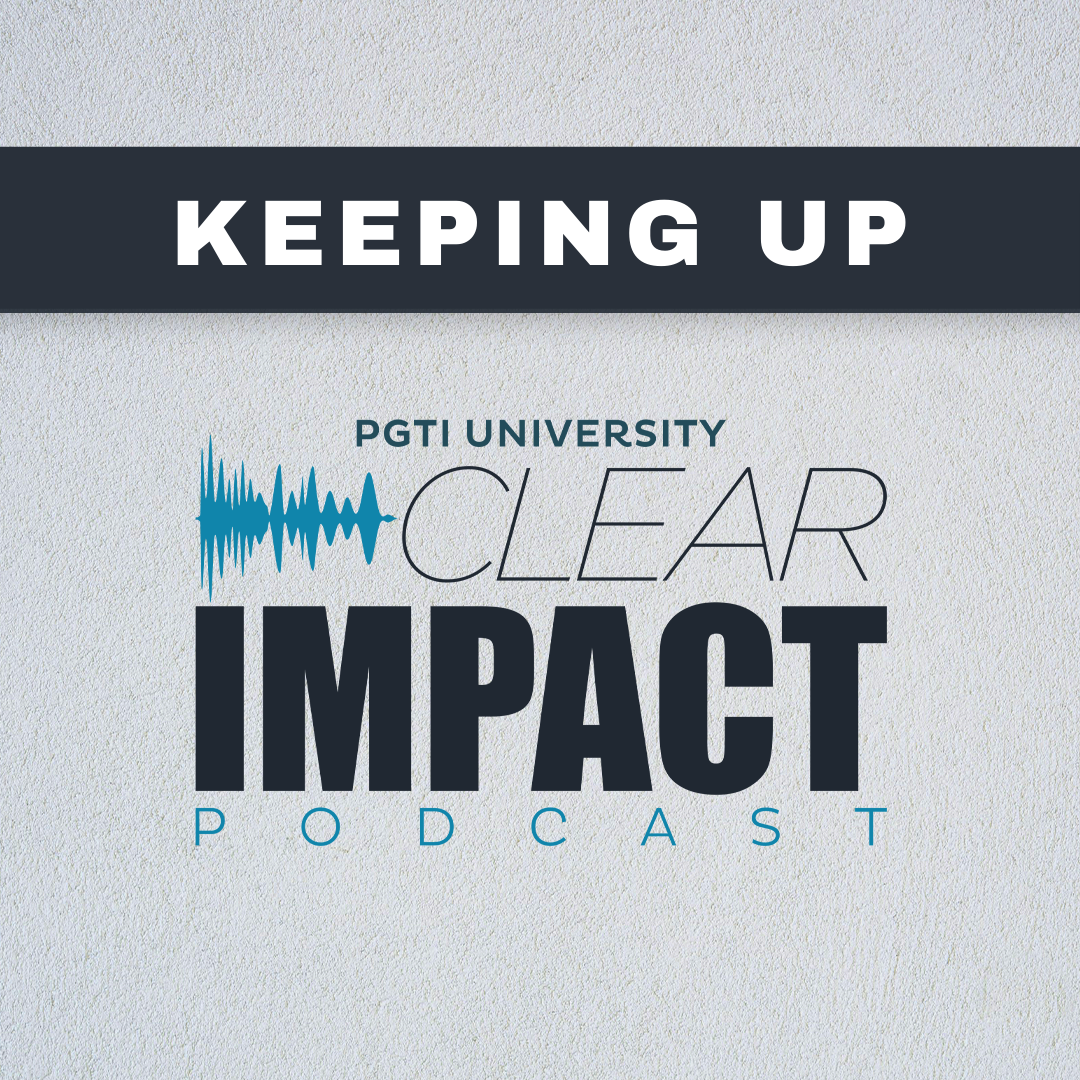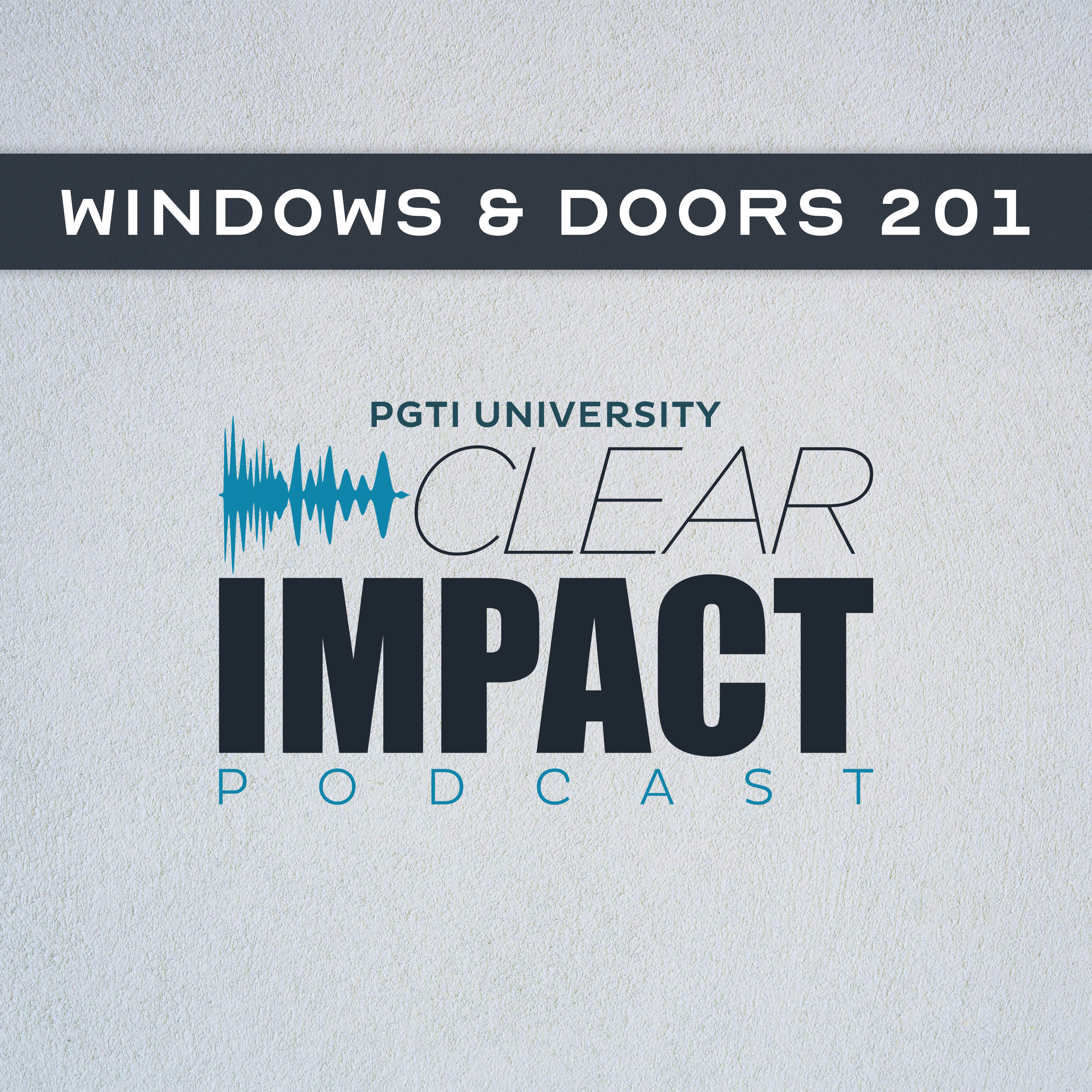Speaker 1 00:00:05 Welcome to the Clear Impact Podcast, brought to you by pg t I University. Thanks for joining us today. My name is Sherry Connor and I am your host. So good morning. We are here on the Clear Impact Podcast and we are finishing up a series around financial wellness, and today's guest is Craig Henderson, and so welcome to the studio.
Speaker 2 00:00:31 Hey, thanks Sherry. It's great to be
Speaker 1 00:00:32 Here. Yeah, I'm glad to have you. I'm glad you could squeeze it in. So we've just met, we've seen each other in the hallways. We've said hello. I'm sure we've exchanged names, but I did not remember who you were until you walked up today, so I'm glad that you're here. Tell our listeners a little bit about you.
Speaker 2 00:00:47 Okay. So I currently serve as the interim Chief financial Officer. In this role, I'm leading the team that supports the company's finance strategy, budgeting and planning, accounting, financial reporting, treasury and investor relation functions. I joined PG t Innovations two years ago to lead the company's financial planning team, and I'm very excited about the opportunity to lead the entire finance function. I began my career in technology working for Dell back in the early days of the internet, and joined PPG T Innovations from Trex, a fellow branded premium building products company. In between those two corporate stints, I ran a successful consulting company helping to provide financial expertise and financial acumen to small businesses. Across my career, my focus has been to try and help make finance become a valued business partner and a strategic advantage to the companies that I've served. I grew up in several locations across the mid-Atlantic and grew up in central Florida also, so it's good to be back in the state of Florida and I earned my accounting degree from Stetson University.
Speaker 1 00:01:58 So wow, you have a lot of responsibility, but it sounds like your experience has really provided a great launchpad for you to step into all of that. And I know that is a tough position to be in, right? It's all about the numbers, it's all about growth and acquisitions and also keeping everything floating and making investments back into the industry and things like that. So for this series, we're leveraging the expertise well for all series really, we're leveraging our in-house expertise to help our dealer audience who are largely small business owners, entrepreneurial. So for them to be successful, what would you say are some key principles around budgeting, both strategic and tactical, what would you advise for those people?
Speaker 2 00:02:45 Sure. So starting a small business requires a solid business plan, including an understanding of potential customers and how we'll serve them. The competition we face and our startup costs for things like equipment and vehicles, the budget and financial projections are a key part of any business plan, helping us to determine the cash required to begin the new adventure and understanding the capital structure required in order to support growth. For small business owners, a key focus is developing and maintaining a healthy cash flow. In order to predict cash flow, we need to understand our fixed costs, things like rent insurance, property taxes, cell phones and software, the costs that don't change with volume to help us understand our cash burn rate. Next comes understanding our variable costs. Costs like materials, advertising, sales commissions, direct labor and distribution costs. The costs that move with sales volume both fixed in variable costs help us to set our pricing for our goods and services and help us to estimate how and when we will become cash flow positive and help us to guide us to maximize our profitability. Okay. Tactically, the budgeting process must be integrated with other business processes like invoicing our customers and paying our bills. And the budgeting process needs to be built on the operational drivers of our business. Things like sales, quoting, things like win close rates, op, just really the insulation costs really, again, just to guide us to be cash flow positive and to maximize that profitability. This requires our budgets to be easy to update. We wanna keep it simple, right? It only needs to be as complicated as it needs to be.
Speaker 1 00:04:34 Yeah, you don't need to count every penny necessarily. Yeah,
Speaker 2 00:04:38 Sometimes you need to watch every penny, but yeah, you're not trying to build out the best Excel model ever to support your growth. You just want to focus on the big rocks. The little rocks will take care of themselves,
Speaker 1 00:04:50 Right? Because sometimes tracking expenses is time consuming and then that can be negative. Like, I'm gonna taste down a $2 and 58 cent receipt, like how much time am I gonna spend looking for that receipt when my time is worth x amount, your time is worth X amount. And like, okay, can we just have a category that says miscellaneous and not worry about it or lost receipt or whatever. So I understand that like you don't wanna have to bury yourself in data if it's not gonna mean something or count for something.
Speaker 2 00:05:20 Certainly, yeah, we wanna focus on the major roles, especially as small business owners, because the reason that we started the business is because we bring something to the market that other people don't. That is where we add value as the leader of the organization, not in making sure that every dime is accounted for.
Speaker 1 00:05:37 And it stresses people out too. So, you know, I know salespeople are much happier to have a per diem than track every single expense or put it on a gas card and then I don't have to worry about getting the receipt and all of those kinds of things.
Speaker 2 00:05:50 And that's not to say that you don't need good controls over your finances and over your accounting, but as the leader, you need to either hire someone to handle that or outsource it to a firm that has provides expertise. You want to be able to focus your time on growing your business and managing the cash flow.
Speaker 1 00:06:11 Be sure to tune in for upcoming episodes to help you understand the fest station industry, what you need to know when buying windows and doors and other related topics. You can find out more about
[email protected]. You can also find us on Facebook and LinkedIn. So how often would someone keep an eye on their budget? Like was that weekly, monthly? Like how would that worked tactically?
Speaker 2 00:06:36 Sure. So from a best practice mm-hmm. <affirmative>, your budget should be an annual budget, right? We take the time at the end of the year to review where we've been, assess our plans for where we're going and build a budget to support that. The budget needs to be a living document though. So daily, weekly you're tracking quoting and sales and production versus budget and versus prior year, monthly, you're reviewing your full financial statements, including your p and l balance sheet and cash flow statement. Quarterly you're looking at, Hey, how am I performing right to understand what's going on both in the market and in how I'm going to market. Again, if the budgeting process is built at the right level of detail and we've kept it simple, then updating it for quarterly forecast is not a big lift and we'd want it to make it not be a big lift.
Speaker 1 00:07:29 Yeah. And the closer that you're paying attention to that, the better it is for everyone. You don't wanna go six months out and go, wait, I wasn't supposed to be taking clients to lunch. Really? Oh, sorry, I didn't know that.
Speaker 2 00:07:39 What would be worse is really if you set your prices too low or set them too high and you're not driving volume to cover that fixed cost, that's really the function of the forecast and the the monthly reviews of those financial statements.
Speaker 1 00:07:53 So if you know that your crew can install 50 windows a day and you have a job that's gonna be 250 windows, okay, can you really plan for five days on that or do you wanna have a little cushion in case there's any unforeseen circumstances? Like maybe somebody's out sick that day or maybe the truck breaks down, or maybe there's a problem with one of the windows, God forbid. I mean, we try to always deliver a perfect product, but sometimes those things happen. So you wanna have a little buffer in there, but not a ton because then you have guys standing around with nothing to do when you're paying them. So
Speaker 2 00:08:28 Certainly we wanna optimize our workforce and we wanna optimize the money outgoing to protect our cash flow and to protect our profitability.
Speaker 1 00:08:37 So are there any favorite tricks or tips or software? I mean, you mentioned hiring someone or having somebody out there, so what advice would you have to share around those ideas?
Speaker 2 00:08:50 Yeah, from talking to my friends in sales, QuickBooks is kind of the standard, standard software that is used to manage any kind of startup with that. I'm kind of software agnostic in that as long as it meets the business needs and you have a good design that supports good financial controls and you can get the information you want out easily. I'm not really too hung up on a software for managing the financials. Most of those programs have a budgeting component to them, and as long as again, the design is built properly, then you can effectively budget and report actuals within the same system. It's key to have them in the same system, otherwise you're, you're dropping down into Excel. From a corporate perspective, the finance team members love Excel and they kinda live in Excel, but it can become the bane of our existence in that, that it's just trying to pull in data from different data sources is challenging. It's much better to have it all integrated into one. So
Speaker 1 00:09:52 If you were hiring a cpa, what are some things to look for and does everyone actually need a CPA or they just need someone who can help with accounting and bookkeeping and taxes, or what would be your advice around that? Sure.
Speaker 2 00:10:04 When you get to a scale to where you're not a sole proprietorship and you're just the only person running the back office, there are a couple of different options that you can take, right? You can hire a full-time bookkeeper. I would recommend investing in a CPA to review those results, even if you have a internal bookkeeper, just because that enables you to have the certified third party that reviews your books to make sure you're not going off course. Again, you're small businesses are really focused on healthy cash flow and cash balances, but you need that check and it's good to have that external check, whether it be monthly with the CPA doing your books for you or quarterly or an annual review. It's very important to do that. And with the gig economy coming out, there are a lot of services that are available to small business owners that can help them really increase their financial acumen without having that specific expertise, right? Because we really want to be focused on growing the business and all of the back office stuff. If we can outsource it to people that we trust, we're gonna be better off and we're gonna be more profitable,
Speaker 1 00:11:13 Right? Because uh, if you're the owner of the business, there are a ton of other things that you need to pay attention to. You can't spend all of your time just crunching numbers, but you can't ignore the numbers either. So it is that balancing act of what aren't you good at? You know, if budgeting and finances are not really your thing, then you probably shouldn't be working for yourself <laugh>, I'm just thinking. But some people are really good at what they do and they're just not as good at managing all of that. And so having another person or another entity managing that for you is just gonna give you more joy and give you a better peace of mind that like, oh, I don't have to worry so much about making sure this is really buttoned up tight. I can trust this other person to give it another view and I don't have to stress about it. Exactly. Okay. It's been lovely having you in here today. Craig. Thank you so much for your time and your expertise and good luck in the interim C f O position and all the 15 things you've listed in your job description. I don't even know what all those are, but I'm grateful for smart people like you being part of this organization.
Speaker 2 00:12:17 Sherry, thanks so much for having me today, and I hopefully that this will, uh, benefit our dealers and benefit our partners. Um, and I look forward to doing this again sometime soon.
Speaker 1 00:12:27 All right. Thank you so much. Have a great day. Bye-bye. Okay, bye. P G T I University is the customer education team for an entire family of brands. We began with the original Easy Breeze, porch and closure line, then became P G t, America's leading brand of impact resistant windows and doors. We then added cgi, CGI I c Window, Western Windows Systems, new South Windows, echo Windows and doors, and Lynn Windows and doors, and our latest acquisition Martin Garage doors. We create products built to withstand major storms, keeping people safe, secure, and prepared. Our exceptional brands give you the protection you need without compromising design or functionality. PPG t I University is here to educate you, our listener, so that you can be a more informed consumer of Window door products.


